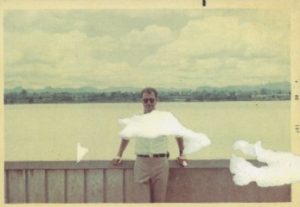
Mekong River.
Edward Whatley was born on June 6, 1941 in Tuscaloosa, Alabama and spent his childhood living on his family’s farm. He attended grammar school in Moundville, AL for the majority of his childhood, and went to high school in Greensboro, AL. After graduating high school, Whatley enrolled at The University of Alabama where he majored in English and minored in History, became a member of the Phi Delta Theta [chapter?] on campus, and met his wife Natalie. Following his graduation from UA, Whatley joined the U.S. Peace Corps where he taught English at Kabul University; when Whatley returned home to the U.S. he enlisted into the Air Force to serve in the Vietnam War.
U.S. Peace Corps
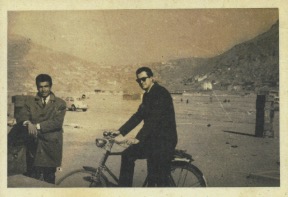
After graduating from The University of Alabama, Whatley joined the U.S. Peace Corps and began volunteering as an English professor at Kabul University in Kabul, Afghanistan from 1964 to 1966. By the time he arrived in Kabul, there was total of 70 Peace Corps volunteers in Afghanistan. This group of volunteers consisted of English teachers, secretaries, telephone operators, postal clerks, statisticians, accountants, and warehouse managers.
So what prompted you to join the Peace Corps?
“Well it was quite an interesting afternoon, a friend of mine lived at the same place I did, and I was going to a movie at the Bama Theater. And the movie had changed when we got down there, and I said “Hey, I saw peace corps tests are being given at the Union building, at the student union, let’s go and take them”. So we did and uh I got accepted to go to Afghanistan.”
Draft and Basic Training
When Whatley returned from Afghanistan he almost immediately enlisted into the U.S. Air Force to serve in the Vietnam War, because he thinks “everybody ‘out to [do some military time].”
Before you served in the war did you have any preconceived ideas fighting in Vietnam?
“No, I just knew that it was a war that we were very much engaged in, and as I said I think everybody needs to do some military time– and so I did. Spent I guess three months perhaps, in basic training at Chanute Air Force base in Illinois, and then got an assignment to Brookley Air Force base in Mobile, and I was there for two and a half years. And then… it was– let’s see– it was during that time I got married, while I was stationed at Brookley. And then so, so I had a whole different perspective on going overseas, but I had to so I had no choice. “
Serving in Vietnam
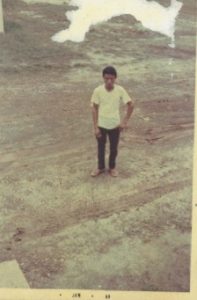
After Brookley Whatley’s next assignment was as a sergeant in weather department at Nakhon Phanom, an “air base in Thailand in the northeast part of Thailand on the Mekong river where it borders Laos and I spent my time at Nakhon Phanom and at Ton San Nhut in Vietnam– just outside of Saigon.”
What was working in weather like?
“I mean it was just pretty straightforward you went into to the weather office and you observed the weather, and you set up balloons, and you made it–got, developed the weather information for the forecast for the pilots to fly.”
In addition, Whatley taught GED and English courses to the soldiers while on the Nakhon Phanom base. He explained that teaching the soldiers felt good because “you felt like you were doing something worthwhile and they appreciated it.”
What did you do during your spare time?
“The village of Nakhon Phanom was close and when we had time off we’d go into the village and uh Thai beer is very good [both laugh], and eat and socialize, buy things on the bazaar, and what have you. Because they’ve been– Nakhon Phanom had been there a good 15 years or probably between 10 and 15 years when I got there, it was established in the early fifties as a one of those bases that was there for gathering intelligence, and then as the war escalated it was expanded and became a staging base for activities in Laos and Cambodia and Vietnam.”
Returning to the U.S.
Since Whatley was an only child, he was sent home from Vietnam when his mother was diagnosed with cancer. Whatley talked about his experience enduring hostility from anti-war Americans when he returned from Vietnam.
“When I got out I flew in through San Francisco. Fortunately, I had a friend there who met me at the airport, but all sorts of things were going on against veterans returning– you know yelling things, obscenities at us, spitting, throwing things at us and because Ron was able to meet me I didn’t have to get out and where the taxis were and so forth. Some of the taxI drivers would not pick up a veteran.”
Life After the War
In 1975, Whatley and his wife moved to Sewanee so he could attend seminary school at The University of the South, and a year and a half later they returned to his family farm and started his career as an Anglican Bishop for students at The University of Alabama. When the Mr. and Mrs. Whatley returned home, they began serving as a host family for international students attending UA.
From 1990-1995 Whatley was appointed to serve on The Alabama State Board of Veterans Affairs representing Vietnam War veterans. During his five years serving on the board, Whatley and others on the board built the Bill Nichols State Veterans Home– a veterans nursing home in Alexander City– and started the groundworks for the Alabama National Cemetery in Montevallo, Alabama. In addition, he and other board members worked on getting PTSD recognized as an official condition, and ended up getting the state of Alabama to discern PTSD as an official condition.
Recently Whatley has began thinking about how being a host family for international students would translate into the veterans community; he and four other veterans have began creating a veteran community on UA’s campus.
“What I am trying to do, and I think we’ve got our (inaudible) pretty well drawn up and we’ve got some people who’ve said they’d be on the board and what were aiming at is establishing a– we’ve chosen a name Community Friends for Campus Veterans CFCV, and what we want to do is get people in the community to be host families for some of the veterans. Particularly the veterans who are from distant places. Because they get here– a lot of them come straight out of the war, and straight to campus and they have all sorts of problems arise and so that’s what we are working on now but that kind of translates back to I think my experience.”
Additional Stories and Photographs
“When I left Kabul I went and spent some time in Pakistan and some time in India, [and] in Burma where I was immediately arrested.”
Keene: [Laughs] What? How? why?
“Oh because the, our government and the Burmese government were at odds Burma’s always at odds with somebody, and uh so I got off the plane and there were they felt that peace corps people and CIA were one operation.”
“So they got me and that was the second time I was arrested. The first one was in Islamabad which was the new capital in Pakistan and we were– three of us were put under house arrest. “
“When I left [Burma] for Hong Kong and spent some time there [and] I had a friend who was a helicopter pilot, but he was the general’s aid in Korea– up on the DMZ– up in the demilitarized zone and I went up there and spent some time. And on the way up one of the things I remember was very distinctly the the farmers, they would have to get their pigs to markets, so they tied the pig on to the back of the bicycle, and pour rice wine down his through and get him drunk so he’d just stay there and they rode their bicycle into market. That reminded me that picture there reminded me.”
“That’s how I quit smoking, I used to smoke– I Started smoking in college and I got over there and I smoked Kent cigarettes and they were shipped in through Karachi–In Afghanistan the were shipped in through Karachi and then brought by truck up to Kabul. and the Indians and Pakistanis went to war and the port of Karachi was closed, and if you wanted to smoke you had to get Russian cigarettes or some other kind of cigarettes– I though its not worth it, so I quit. When I quit in Afghanistan, I quit”
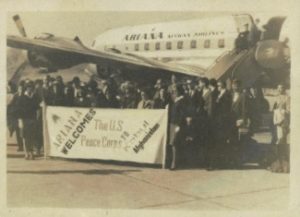
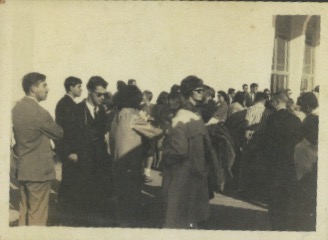
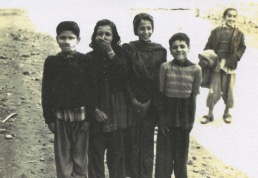
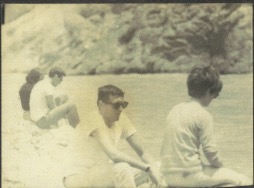
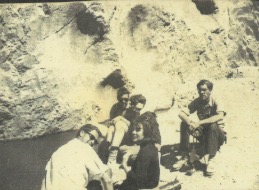
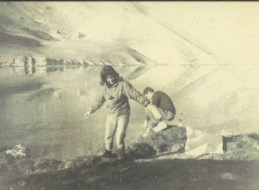
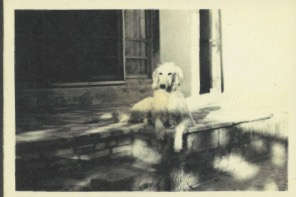
Interview Audio:
https://soundcloud.com/user-698244866/edward-whatley-interview
Interview Transcript:
Further Readings
Jeffery, Thomas E., “Educational Testing in Afghanistan.”, Human Organization 24, no. 1 (1965): 83-88.
Neusner, Jacob. “University Studies in Minority Cultures: A Plea for Strengthening the Study of Neglected Civilizations.” The Journal of Higher Education 35, no. 4 (1964): 202-206.
Rosenau, William, “U.S. Air Ground Operations Against the Ho Chi Minh Trial.”, Special Operations Forces and Elusive Enemy Ground Targets: Lessons from Vietnam and The Persian Gulf War (2001): 5-27.
DeSaussure, Hamilton, “The Laws of Air Warfare: Are There Any?”, Naval War College Review 23, no. 6 (February 1971): 35-47.
Casella, Alessandro, “U.S.- Thai Relations.” The World Today 26, no. 3 (March 1970): 118-12
Bell, Peter F., “Thailand’s Northeast: Regional Underdevelopment, ‘Insurgency,’ and Official Response.”, Pacific Affairs 42, no. 1 (1969): 47-54.